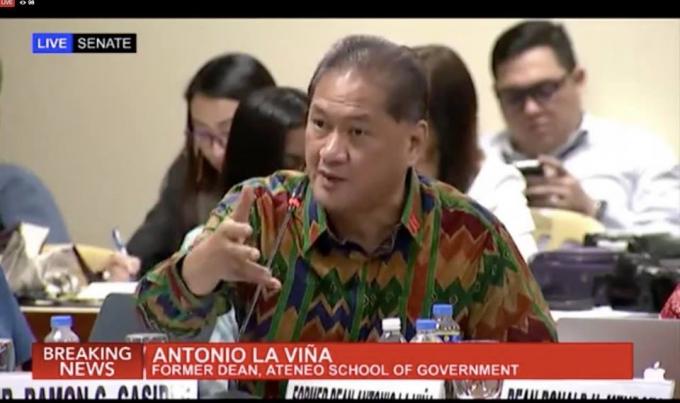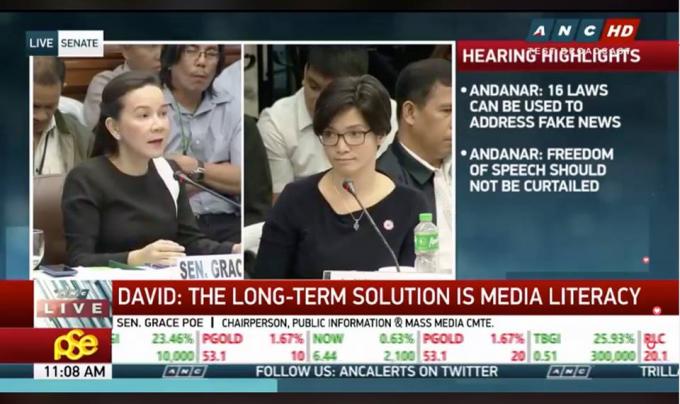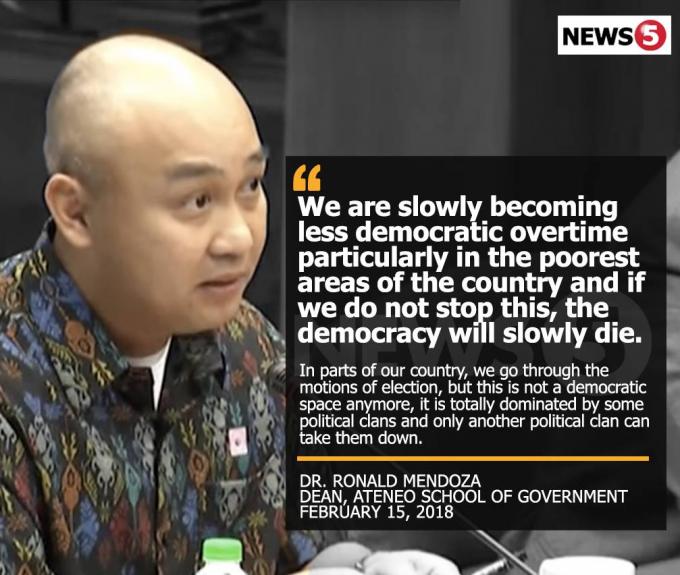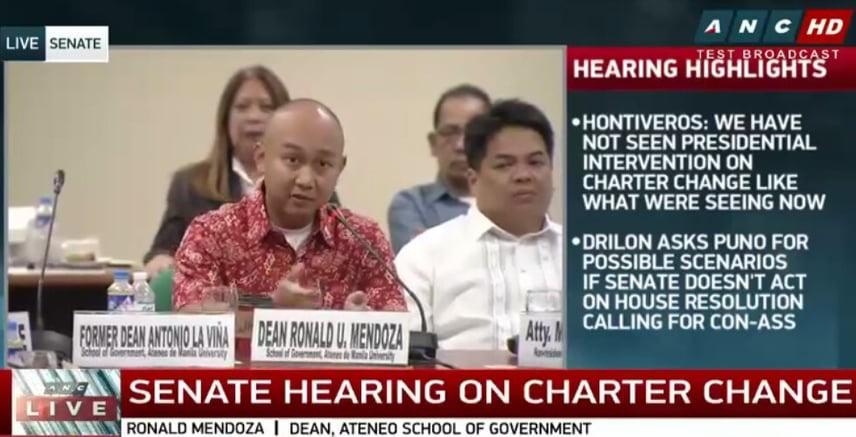ASOG works to promote legislative reforms through research and thought leadership
20 Feb 2018
As part of its mission to support institutions building in the public sector, ASOG faculty and experts recently provided inputs to help advance evidence-based legislative and local governance reforms. Dr. Ronald U. Mendoza, Dr. Antonio G.M. La Viña, and Non-Resident Research Fellows Atty. Michael Henry LL. Yusingco and Dr. Clarissa C. David were invited by the Senate to testify on the evidence associated with key legislative reforms.
Charter change, federalism and development
At the hearing on charter change organized by the Senate Committee on Constitutional Amendments and Revision of Codes last January 17, 2018, committee chair Senator Francis Pangilinan invited experts to share their analysis on whether and to what extent Constitutional amendment or revision is actually necessary. Some of the country’s top legal minds, including former Chief Justices Hilario Davide, Jr. and Reynato Puno and members of the 1986 Constitutional Commission Justice Adolfo Azcuna, Dr. Florangel Rosario-Braid, and Prof. Edmundo Garcia, weighed-in on this topic, revealing mixed opinions. While former Chief Justice Puno and former Senator Nene Pimentel advocated for charter change towards full fledged federalism, former Chief Justice Davide noted that pursuing federalism now is akin to "a lethal experiment, a fatal leap, a plunge to death, a leap to hell."
ASOG researchers also provided inputs, drawing on the school’s long history working with local and national government agencies, and training government officials and leaders, as well as recent research by the Ateneo Policy Center.
Dr. Ronald U. Mendoza on a potential Constituent Assembly:
“The present situation, however, of a potential Con-Ass can be assessed in three words: conflict of interest. To fundamentally overhaul our democracy, the concentration of economic and political power, the very same features that produce the many governance and economic failures that drove us to today’s discussion, will need to be reformed.”

Dr. Antonio G.M. La Viña on whether to proceed with Con-Ass or Con-Con:
“To change the Constitution and to do it right, you must actually follow the right procedure that is acceptable to the people [and] that makes the people participate as extensively as possible. And in that sense, a Constitutional Convention is always superior over other forms.”
Fake news and democracy
At the hearing on fake news organized by the Committee on Public Information and Mass Media, legislators examined options on how to stop the spread of fake news, and they tried to determine whether legislation is the proper remedy. The hearing tackled three (3) issues namely: extent of responsibility and accountability of bloggers and journalists in spreading misinformation; effect of online platforms like Facebook in shaping public opinion and facilitating the spread of misinformation; and accountability of government for the use or misuse of resources in spreading disinformation or suppressing the truth.
ASOG non-resident research fellow, Dr Clarissa David, a prolific researcher in the area of public communications and social media, shared her views on how to stop misinformation and disinformation. She noted the important role of government, academia and civil society, arguing that citizens need to be given the means to sort through vast amounts of information to be able to discern better.

Dr. Clarissa C. David on next steps to address misinformation and disinformation:
“The long-term solution is really media literacy and news literacy programs, and teaching people that verifying truthful information [and] giving them the tools to do that is important. That said, I don’t think it should be done solely by government. I think it should be a collective effort of the formal education system, by CSOs and NGOs, and the media themselves to really inoculate the public from potential effects of disinformation or misinformation.”
Regulating political dynasties and building a more inclusive democracy
ASOG also provided evidence-based inputs at a recent hearing on anti-dynasty legislation organized jointly by the Committee on Electoral Reforms and People’s Participation and the Committee on Constitutional Amendments and Revision of Codes.
Drawing on published and ongoing research by AIM and Ateneo de Manila researchers, Dr Ron Mendoza noted how banning political dynasties may not necessarily be politically feasible, given that almost 80% of Congress is dynastic. He argued that it might be useful to distinguish dynasties according to their context and behavior, noting that the evidence suggests fat dynasties are the ones worsening poverty particularly in the countryside.
Recently, Dr Edsel Beja, Dr Victor Venida, Dr Ronald Mendoza and David Yap published several key papers on political dynasties, including articles in the Philippines Political Science Journal, the Oxford Development Studies Journal and an edited volume with a group of international experts working on political economy, titled Building Inclusive Democracies in ASEAN (published by Anvil Press in 2015).
Drawing on these studies as well as ongoing work by the Ateneo Policy Center, Dr Mendoza noted that it is probably more pragmatic to focus on dynasty regulation—to limit the rise of fat dynasties (sabay-sabay tumatakbo at nanunungkulan) and give more leeway to thin dynasties (sunod-sunod tumatakbo). He also noted that this is ideally packaged with other reforms like political party reforms and anti-turncoatism; and that these together are critically important pre-conditions for the success of decentralization and perhaps even federalism.
Without these reforms, Mendoza warned, it is difficult to imagine that any new form of government like federalism would be executed well and produce the desired development that its advocates aspire for.

Dr. Ronald U. Mendoza on effect of political dynasties to democracy:
“We are slowly becoming less democratic over time particularly in the poorest areas in the country, and if we do not stop this, the democracy will slowly die… In parts of our country, we go through the motions of elections, but this is not a democratic space anymore. It is totally dominated by political clans and only another political clan can take them down.
We are speaking for the young people. We are speaking for those provinces who can no longer speak for themselves, because they are captured by these political clans [fat political dynasties].”
